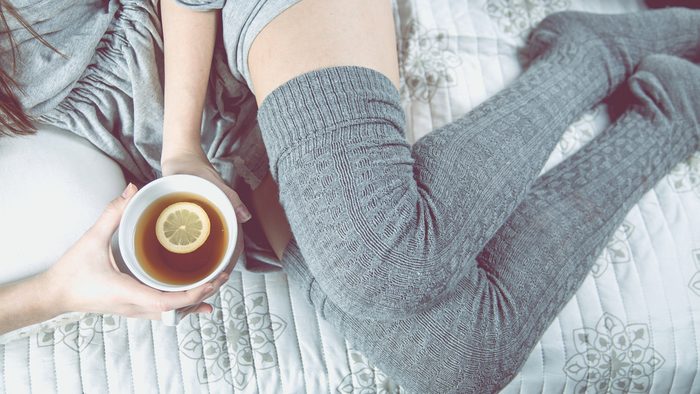
What you eat and drink just might be keeping you up at night
Research shows that consuming the right foods and achieving sound sleep are related: The dietary decisions we make during the day can help or harm our nighttime shut-eye. Follow our guide to make the best food choices for a good night’s sleep.
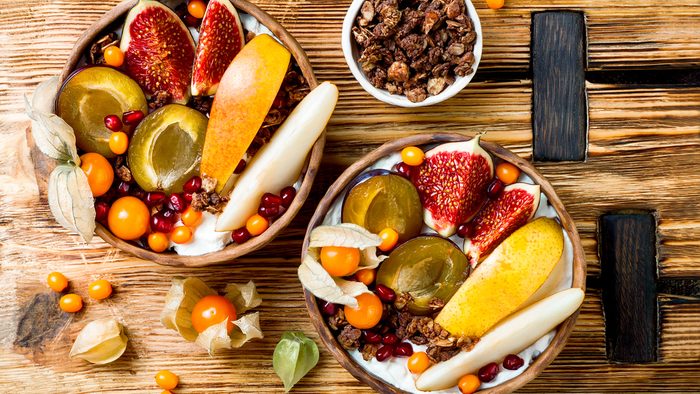
Mix it up
A study by the Perelman School of Medicine at the University of Pennsylvania found that those who net a healthy dose of sleep (seven to eight hours each night) also report eating a more varied diet than those who log shorter or much longer sleeps. Stuck in a food rut and need some inspiration? “Add a new vegetable to your shopping cart each week and seek out a new recipe to incorporate into your repertoire, suggests Miranda Malisani, a nutritionist based in Toronto.
Not enough shut-eye last night? Here are 7 Ways To Get The Best Night’s Sleep Of Your Life.
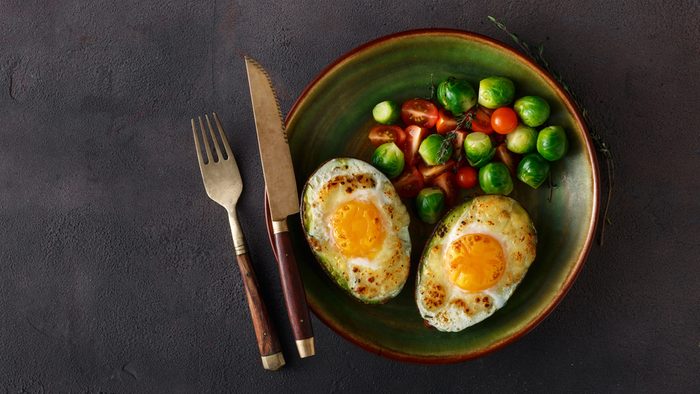
Don’t sleep on it
Ideally, you should eat your last meal two hours before bed and avoid heavy, high-fat dishes. A body consumed with digestion isn’t focused on the business of sleep. “Lying down with a full stomach over an extended period increases the chances of acid spilling into the esophagus, a condition known as acid reflux,” says Dr. David Klein, a medical doctor and sleep specialist at the Toronto Sleep Institute. “Downing spice-laden dishes in the evening can also result in heartburn and a restless night.”
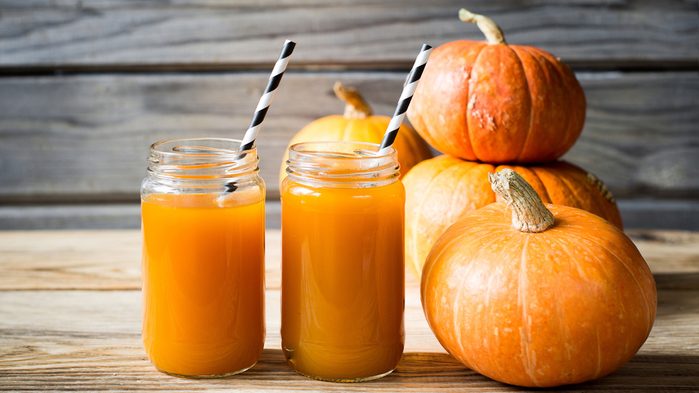
Power down with pumpkin
“Pumpkin seed powder is the new warm glass of milk, packing a potent punch of the amino acid tryptophan,” says Dr. Natasha Turner, a naturopathic doctor and New York Times bestselling author of The SuperCharged Hormone Diet. Tryptophan produces two hormones essential for sleep: Serotonin, which promotes slumber and regulates mood, and melatonin, which helps control your sleep/wake cycle. Swap your evening glass of milk for a bowl of unsweetened Greek yogurt topped with a pinch of pumpkin powder or a handful of seeds to really get you ready for bed.
We are so into these pumpkin spice indulgences right now.
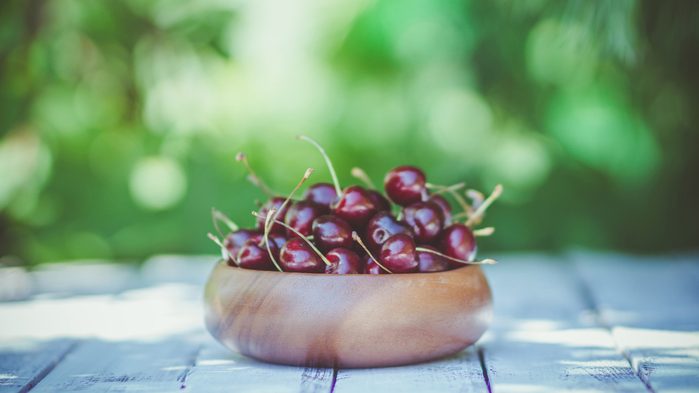
Put the cherry on top
Sour cherries have naturally occurring melatonin, the hormone produced in the brain that helps fight insomnia and promote sleep. (This may be why you have insomnia.)
Recent studies show that “consuming tart cherry juice can help you stay asleep, sometimes up to 90 minutes longer,” says Malisani. Try drinking ½ cup to one cup of tart cherry juice an hour before bed to extend your trip to dreamland.
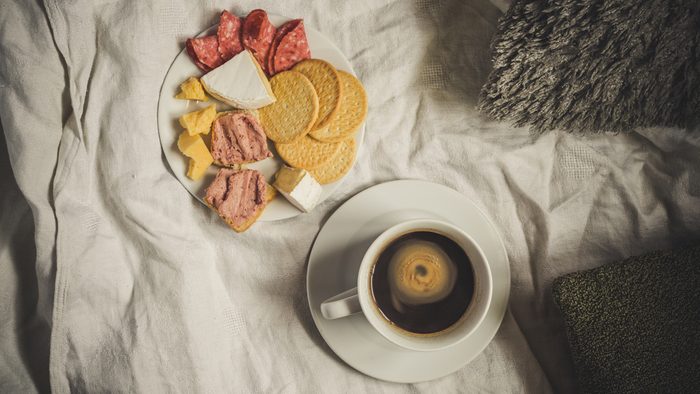
Dial it down
When it comes to late-day eating, aim to cool down your core body temperature before bed. The cooler you are, the more melatonin you release. (This is how melatonin works in the body.) So you can have a cup of tea in the evening, but don’t eat foods like carb-rich snacks, which require a lot of energy to digest and can raise your body temperature as a result.
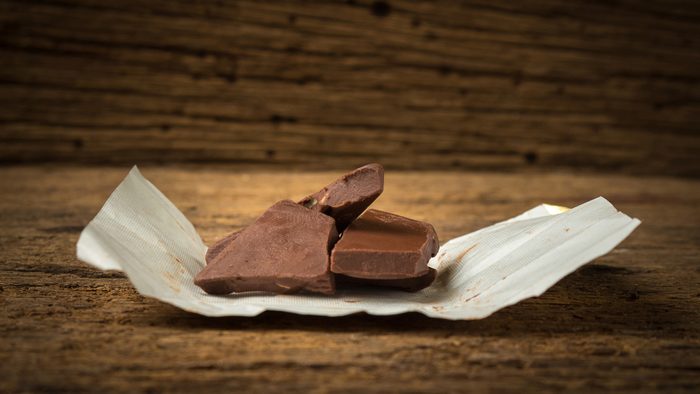
Spare a square
Good news, chocoholics! Chocolate contains tryptophan and is one of the richest dietary sources of magnesium, which can help improve sleep. Whether it’s a square of dark chocolate, a mug of hot cocoa or a glass of cold chocolate soy milk, this natural sedative provides a potent dose of sleepy-time magic.
Need more reasons to love chocolate? We’ve got seven of ’em.
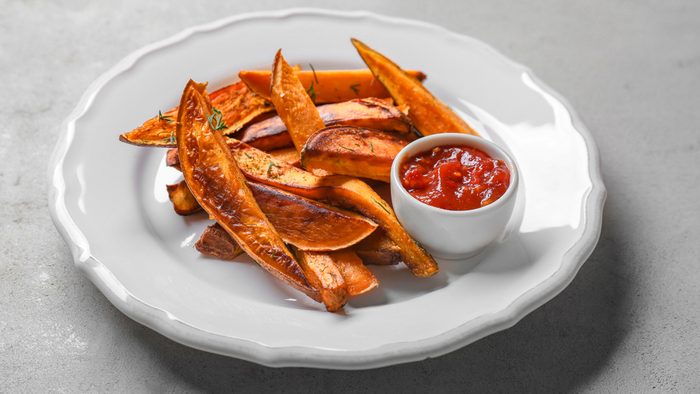
Choose carbs carefully
Eat starchy, low-GI carbohydrates only around the dinner hour (6 to 8 p.m.), not afterwards, to boost serotonin levels needed for sound sleep. Opt for quinoa, squash, buckwheat, sweet potato or legumes. Avoid processed carbs, such as breads, cereals, muffins and cookies, which prompt a short-term spike in blood sugar, followed by a crash. “As blood sugar levels drop, adrenalin, glucagon and cortisol are released to regulate blood glucose levels,’ says Dr. Turner. ‘These hormones can act as a stimulant, causing you to wake up or sleep less restfully.”
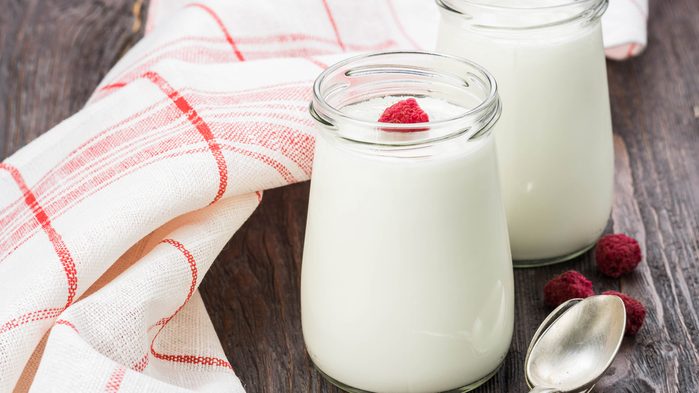
Make a four-whey stop
“I recommend having a small meal with whey protein, such as Greek yogurt [which is higher in whey than regular yogurt], a protein bar containing whey or a protein shake with whey isolate at 4 p.m.,” says Dr. Turner. ‘Whey is proven to reduce cortisol levels in the brain, which can help improve your ability to fall ‘ and stay ‘ asleep.”
(Hold on, though. Find out if you are lactose-intolerant first.)
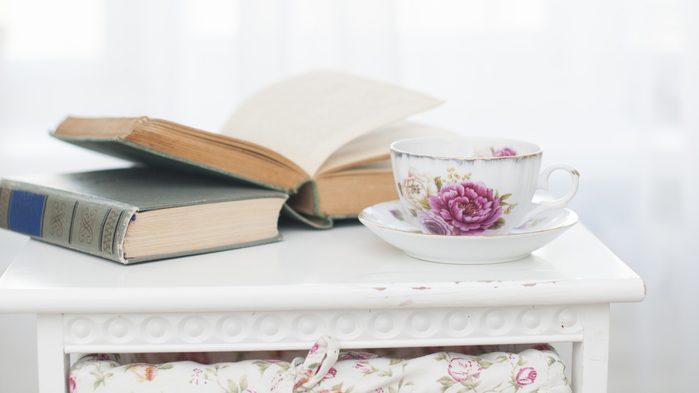
Nix the caffeine
Axing that triple-shot Venti latte order after 3 p.m. is still a golden rule for coffee drinkers. But managing caffeine intake doesn’t end there: You should quit coffee (and tea) by noon if you’re having sleep issues. And then there are other sneaky sources of caffeine: Read the labels on sodas and energy drinks, as well as common over-the-counter meds, such as pain relievers and weight loss pills, because they often contain the stimulant.
Are you drinking too much coffee? Here are the signs you are over-doing it with caffeine.
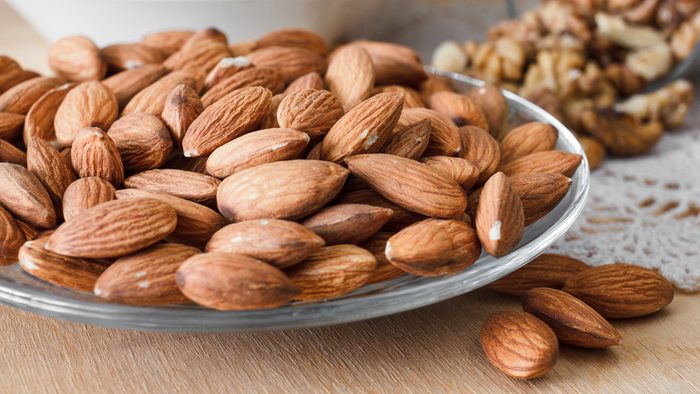
Go nuts
< Snack on raw nuts that are high in sleep-inducing melatonin and tryptophan, such as almonds and walnuts. Research published in The Journal of Nutrition discovered that the naturally occurring melatonin (produced during the hours of darkness) found in walnuts finds its way into the bloodstream and can lead to a better rest.
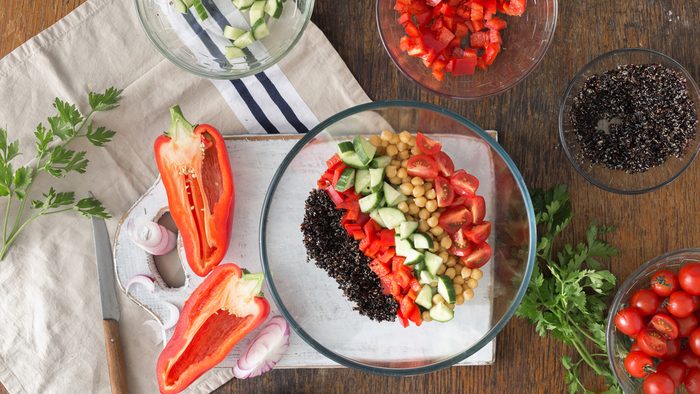
Eat on the clock
Consume a balanced, GI-friendly diet that includes a combination of protein, fat, carbohydrates and fibre at every meal, and eat at regular intervals to help control your circadian rhythm. “Skipping meals, not consuming enough calories, waiting too long before having breakfast or eating too close to bedtime can raise cortisol levels and interfere with your ability to fall – or stay – asleep,” says Dr. Turner. (Also, did you know this is the best time of day to eat to lose weight?)
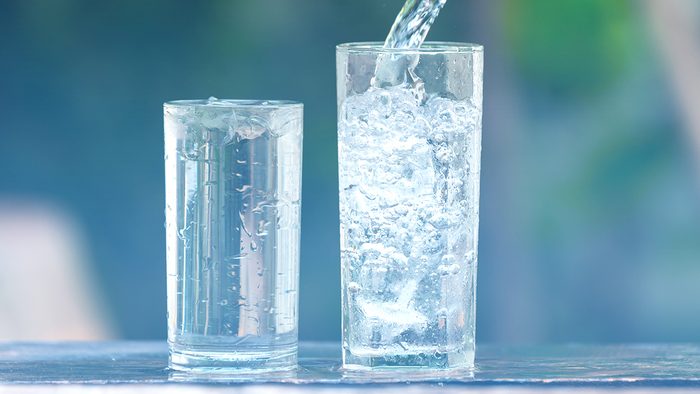
Quench your thirst
To avoid waking up in the middle of the night, limit your liquid intake two or three hours before bed. Nothing hurts your chances of getting a good night’s sleep more than multiple trips to the washroom to empty a full bladder.
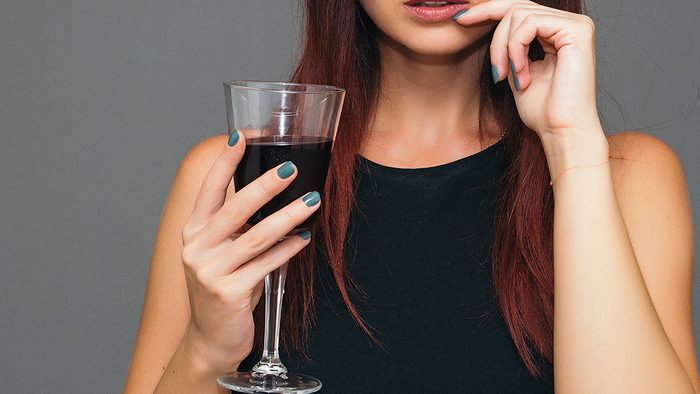
Go for good grapes
Scientists have discovered that the grapes used to make some of the most popular red wines contain high levels of the sleep hormone melatonin. But limit yourself to one glass of wine with dinner – and not too close to bedtime. “While alcohol can certainly help you fall asleep, it can lead to broken, fragmented sleep during the second half of the night,” says Dr. Klein.
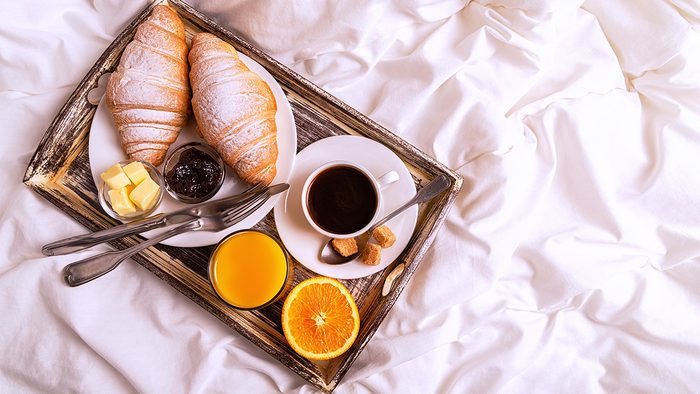
Dream on
A lack of sleep is consistent with a propensity to overeat. A study published in The American Journal of Clinical Nutrition found that the amount of sleep you clock could affect your appetite and how you respond to food. Dreaming of a greasy breakfast? Sleep deprivation can hinder your ability to make wise food choices while increasing your tendency to crave fatty foods. Getting a good night’s sleep is the easiest way to keep cravings in check.
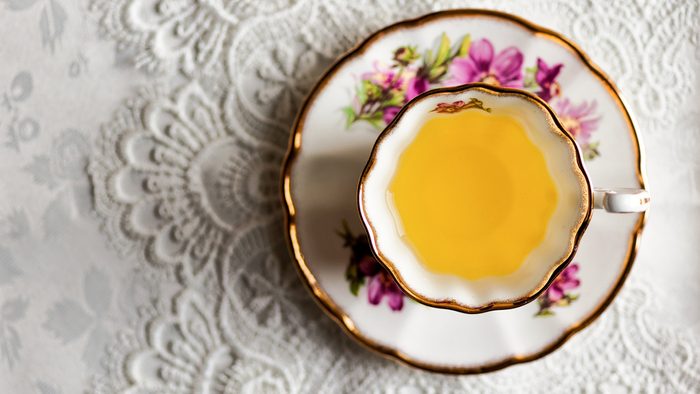
Reach for a cup of v
For a soothing, slumber-inducing elixir, opt for tea with calming valerian root, which can naturally promote drowsiness and contribute to a relaxed and lengthy sleep.
Need more help with getting to sleep? Here are four other better sleep tips you should try.
